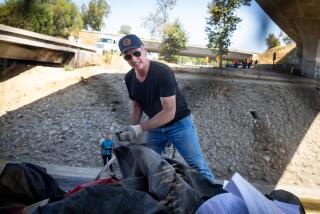PERSPECTIVES ON WELFARE REFORM : Punishment Is No Cure for Poverty : ‘Welfare reform,’ as practiced in several states and proposed in California, is a proven failure. It merely appeals to angry voters.
- Share via
Poverty is not an attitude problem. Yet all over the country, “welfare reform” programs treat it as such. Their remedy is to “get tough” with the poor, cutting aid and telling recipients to change their behavior and fix their own lives.
Politicians from George Bush to David Duke to Govs. Tommy Thompson of Wisconsin and Pete Wilson of California are cashing in anew on the old idea that the poor are to blame for their plight.
Wilson jumped on the welfare-reform bandwagon last month with a ballot initiative he calls the “taxpayer protection act.” Pitting middle-class voters against the poor, Wilson blames welfare recipients--many of whom do not vote--for California’s economic troubles. He would refuse additional aid to women who have more than one child and cut grants to families where able-bodied adults are not working. These measures may appeal to disgruntled voters, but they will only compound the desperation of the poor and unemployed and help trap a generation of children in lives of deprivation and poverty.
Welfare reform promises to break the cycle of poverty. It doesn’t and it won’t. States are not only tearing at the safety net; under federal welfare-reform guidelines, they also are spending scarce dollars to train the poor for jobs that are not available to them. In Arkansas, the short-sighted programs include “self-esteem building” seminars in areas with unemployment rates as high as 20%.
Wisconsin, the state that has broken the most ground, is a case study in the bad planning and poor results that characterize these programs. It may also provide clues to California’s future.
Welfare recipients who participated in Wisconsin’s job training program were less likely to find and keep jobs over a two-year period than those who had no job training, according to a state study. Despite such poor results, the state increased funding for the program from $7 million in 1987 to at least $45 million in 1991.
Wisconsin has also made national headlines with Learnfare, cutting off aid to families whose teen-agers miss too many days of school. Like job training, Learnfare has been a miserable failure. Dropout rates increased dramatically in Milwaukee, where most of the Learnfare sanctions occurred. A federal judge issued an injunction against the program when the sanctions left hundreds of families homeless and hungry, many of them victims of erroneous record-keeping. Learnfare also did nothing to improve schools where, in some cases, teen-agers were afraid to attend because of gang violence. Losing the family’s government aid didn’t make things better.
Wisconsin’s latest experiment is Bridefare, which would encourage teen-age mothers to marry and cap grants for families with more than one child. There is no evidence that this effort at social engineering will have any positive effect. But the idea of imposing discipline on poor families has enormous popular appeal.
The quickest way to save money on welfare is to kick people off. And politically, tough talk appeals to beleaguered taxpayers, offering a simple solution and a convenient villain for complex social ills. But if our public officials really want to break cycles of poverty and welfare dependency, they had better start tending to unemployment, collapsing schools and a deteriorating standard of living.
Welfare reform policy has already failed. It does not save money or put people to work. The number of welfare recipients throughout the country continues to rise and the social costs of abandoning a generation of children will soon come due.
More to Read
Get the L.A. Times Politics newsletter
Deeply reported insights into legislation, politics and policy from Sacramento, Washington and beyond. In your inbox twice per week.
You may occasionally receive promotional content from the Los Angeles Times.










